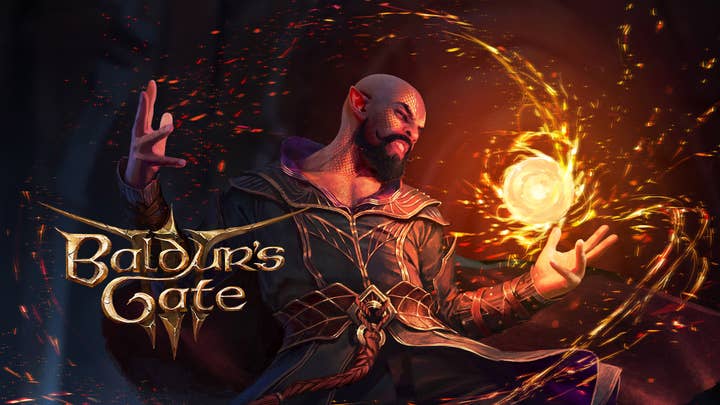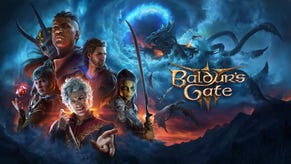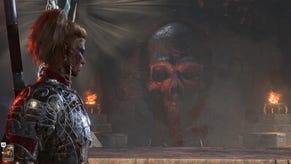One year of Baldur's Gate 3: An adventure in failure and success
Larian CEO Swen Vincke discusses the complexity of invisible rules, self-imposed high standards, and salami as a weapon
It's a different world since we last talked to Larian Studios' CEO Swen Vincke.
In February 2020, the studio had just started showing Baldur's Gate 3, and Vincke talked to GamesIndustry.biz about working on the iconic IP, at a press event organised in Paris.
The event was part of a wider preview tour that also then went to Germany and America, wrapping up with PAX East 2020. There was no knowing that this would be the last in-person event for the Larian team for almost two years.
When we talk to him this time around -- shortly after EGX, which marked Larian's return to physical events -- he's actually in Canada, on a tour to visit all Larian studios across the world. Vincke has been catching up with his teams, travelling for an entire month after a year and a half of staying put. And while the obstacles linked to the pandemic are still fresh in his mind, the greatest hurdle the team is facing is linked to the pressure it puts on itself, and nothing else.
"This project is certainly the most challenging one that we've done, just because of our sheer ambition of getting the polish level so high"
"The biggest challenge is just getting everything done," Vincke says. "There's just so much, it's a very large project with a lot of ambitions with an insane amount of permutations, and making sure that everybody will have fun, regardless if you're a cleric of Shar or a Barbarian-Paladin-Druid multi-class.
"In terms of scope, you start with ambitions to do everything and then as the realities of production hit you, you say: 'Maybe not that, maybe not that'. That is the way it works, right? For us this project is certainly the most challenging one that we've done, just because of our sheer ambition of getting the polish level so high."
Baldur's Gate 3 launched in early access on Steam a year ago. Larian's previous title, Divinity: Original Sin 2, was in early access for a year before its full release, but BG3 looks to take considerably longer, with Vincke having already shared that the title will not fully launch this year. So the studio is having to mitigate the dangers of early access.
_fSBw9y9.jpg?width=720&quality=70&format=jpg&auto=webp)
"It's something that we think a lot about," Vincke says. "The biggest risk is that there's a certain amount of fatigue that might pop up, certainly among the press. You can imagine that people say: 'Hey, it's been in early access for forever, when is it going to come out?'
"I think the most important thing I can say about that is also what I say to the team: it doesn't really matter how long it's going to be in early access, what's going to matter is what the result will be. If the result is going to be the experience that everybody expects it to be, then it will be fine, because people are going to have a tremendous amount of fun when they're going to be playing it. That is the end goal so we keep that in front of us, and then the time it takes is the time it takes.
"It doesn't really matter how long it's going to be in early access, what's going to matter is what the result will be"
"Making games is complicated and this is a complicated game, so there's little that we can do about accelerating it. We are scaling up, we're putting a lot of resources into it -- a lot more than we expected -- to give the game the development that it deserves, so we can't do much more than what we're doing. It just takes time."
Larian opened a new Guildford studio in February, acquiring the Turbulenz team, and then a Barcelona one in June, composed of former Blitworks staff who had worked on the Nintendo Switch version of Divinity: Original Sin 2.
"These were two teams that we'd [been] working with already for multiple years, and we wanted to make sure that they were going to keep on working with us," Vincke says. "They were both based in locations where there's a lot of talent available. As we need to grow, we need to attract more talent, and ever since we acquired them it's proven itself already that they are two pillars of our entire studio.
"It probably was one of the easiest things I had to decide because it's a no-brainer. The [teams are] incredibly talented, so when you have the bread and butter of making games as talent, if you have people that are that talented, you want them to be working on your game."
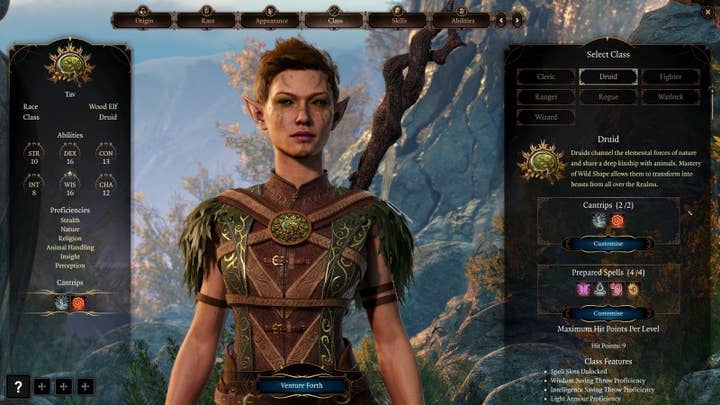
Baldur's Gate 3's early access has proven extremely successful so far, literally breaking Steam on release, and leaving thousands of players unable to purchase the title while technical issues were being resolved. It peaked at over 70,000 concurrent players right after launch, and has since benefited from a consistent stream of updates delivered to a loyal fanbase. But Vincke says he doesn't measure success based on sales numbers.
"Making games is complicated and this is a complicated game, so there's little that we can do about accelerating it"
"It will be [a success] if the majority of players enjoy the game. That's literally it. And I think we will know when we hit that bar because it will mean that we will be enjoying playing the game also. That's really the benchmark.
"If we hit that then we'll be happy. If we don't and we get bored, then we will be very unhappy. So we're not going to let that happen. We did the same thing with the previous games and that is really the formula for us: it has to be fun. We know what we're making. But again, it's just that it takes so bloody long," he laughs.
"I think that the most important thing that you can see is that the game is getting better as a result of the early access and as a result of the community, which is really why we're doing it."
Baldur's Gate 3 entered a CRPG market that has experienced a resurgence in recent years, both thanks to the booming popularity of Dungeons & Dragons, and thanks to Larian itself with the incredible success of Divinity: Original Sin 2.
"We just put a lot of love, money and effort into this one game because we figured that if it's really good, people are going to come and play"
"The market for the type of RPG that we're making is huge," Vincke continues. "I think that a lot of people just don't realise that they play this type of game. Original Sin 2 for instance really sold a lot. And it did that by people getting their friends to try it out. That was really the marketing campaign. It's people getting [others] to start playing and it just spreads like that.
"And I think we could do much better still, which is what we're trying to do with BG3, and opening up the type of gameplay, because really it is very simple : here's a problem or situation, you can talk to the guy, you can ask a couple questions, he reacts to it, you got a bunch of things that you can do, and oh my god everything's on fire. That's appealing to everybody.
"So I don't really bother about wondering how large [that market] is. We just put a lot of love and a lot of money and effort into this one game because we figured that if it's really good, people are going to come and play. And I know that it's not necessarily the most business savvy approach to it, but if there's enough people that are willing to buy to play it and 'some' is larger than what you're putting into it, you'll be okay and that's pretty much how we're approaching it."
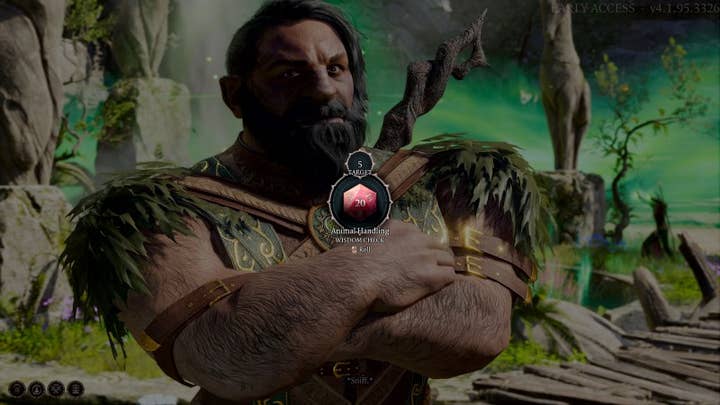
A lot of the work Larian is accomplishing with Baldur's Gate 3's early access actually revolves around accessibility and onboarding, and how you convey the complex rules of D&D in the simplest way possible.
"We have an entire group that's working on this, so they're getting new players that have never played a game like Baldur's Gate 3 before, they're doing tests trying to figure out what it is that we need to explain, because some of these rules are really complicated.
"We wanted to make sure that failure was as much fun as success and, in failure, sometimes, you found much more adventure than in success"
"You don't want a game to be complicated, you want it to be very natural and very intuitive and so there's a lot of work being done on the background that we haven't shipped yet, where we're trying to say: what is the best and easiest way for a player discovering this rule so that they intuitively take it into account? This early access is clearly obviously a very important platform for us.
"I think when you'll see what we will release compared to where we started, you'll have this feeling of: holy shit, this is very, very accessible, I don't have to think about it, it just makes sense. And that's exactly the experience you have if you play D&D in real life. If you have a good DM, they're not going to bombard you with 300 pages of rules that you need to learn, they're just going to be: hey, you enter a dungeon and there's a door. What do you do?"
Not all aspects of D&D will be easily translated to a video game, with Larian introducing interesting changes since Baldur's Gate 3 launched in early access, such as loaded dice. It's an optional feature that increases the chances of rolling higher.

On the surface, this could be seen as fundamentally against what D&D is about. But randomness in a video game has to be treated differently than randomness in real life, giving a glimpse at the type of the challenges Larian is facing while developing the title, adapting a specific set of rules while still making it appealing as a video game.
"This is actually the result of early access and how people reacted," Vincke says. "When we started making the game we said: look, one of the core philosophies of D&D is that you go with the roll, and then if it goes bad or good that's going to decide something, but that's the fun, you just go with it and you see what happens. We wanted to make sure that failure was as much fun as success, so we kept on working and, in failure, sometimes, you found much more adventure than in success.
"But clearly the human mind doesn't work necessarily that way. When they see a failure, they reload. We actually got some flack for some of those things that we were doing. So we said we'll make an option there for the people who, when they see 80% [chances of success], what they really expect is a 100%.
"And to be fair I'm the same. If someone says you have an 80% chance, I do not expect to fail. Still, I suppose that there's a one in five chance I'm failing, that means that one in five of them is going to fail and the fifth one is of course going to be the most important hit."
_YrS2J5o.jpg?width=720&quality=70&format=jpg&auto=webp)
And when a player fails on their most important hit, in a video game, they unfortunately often turn against the developer, leaving negative reviews, Vincke points out.
"We want to have that Dungeons & Dragons feeling, not slavishly following every single one rule, but... just having a good time"
So a lot of invisible work is happening on Baldur's Gate 3 so it feels right, and some of it will go completely unnoticed by the player.
"The loaded dice certainly worked for a lot of players," Vincke continues. "The dice are very important in the game, because it's the core of the system. But there's also these passive rules happening in the background, something that we maybe should emphasise a little bit more.
"I was really inspired by seeing one of the DMs at Wizards [of the Coast] play -- we had a session with him and he just kept rolling that dice continuously. And we were all like: what's happening? What's he doing? And that was a really good feeling. And we want the player to feel that also, so that when they're playing the game they're like: 'it meant something could have happened!' And so when you replay and you see the dice go differently, you realise how much actually is underneath it. And the net effect is not necessarily to demonstrate how much work we put in it, the net effect is that suddenly you realise: hold on a minute, all of this matters, this is all important.
"Before you knew it, it was a thing, and you can dual wield the salamis"
"We want to have that Dungeons & Dragons feeling, not slavishly following every single one rule, but really getting the feeling of playing this tabletop experience but everything is being done for me, this dungeon master is doing everything automatically, I'm just having a good time. It's really about us removing the barriers to entry and shoving it in front of people's noses really so that they just give it a go, and then usually it clicks. Because if you go to the reviews of BG3, of DOS 2, one of the things you really often read is: 'I never thought I was going to enjoy this, but here I am, a hundred hours later!'"
Larian is certainly doing everything it can to make sure there is no Baldur's Gate 3 fatigue happening since it launched in early access, regularly holding its Panels from Hell to update players on the latest patches.
It even ran a LARP (live action role-playing game) to announce its latest update, which saw one of the players use a salami as a weapon, which had such a great reaction from fans that it ended up in the game itself. It may sound like an anecdote but it's actually a great example of how Larian is approaching this early access.
"Nobody asked for that. That's what I like about my company, I woke up the next day and there was a developer who said: there is a salami weapon. Before you knew it, it was a thing, and you can dual wield the salamis.
"Of course you only get it if you saw that particular stream, but still it's fun that you can do it. If I were to play D&D that's one thing that I might actually do: I pick up the salami and I smack the monster on its head. So that's the cool part, and there's plenty of stuff that happens like that, where [players] don't expect any of it. And that's how you want it to be with game development."
